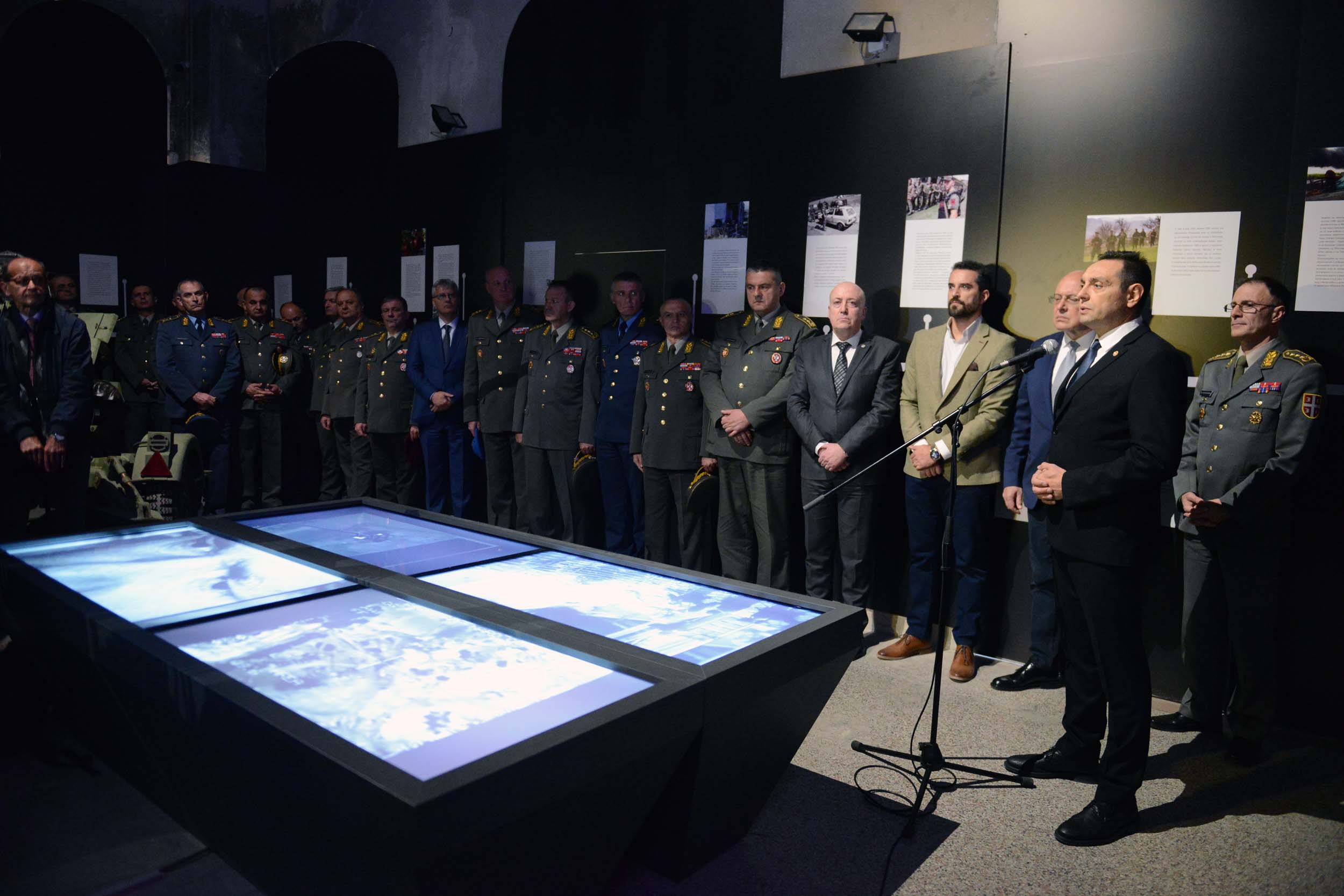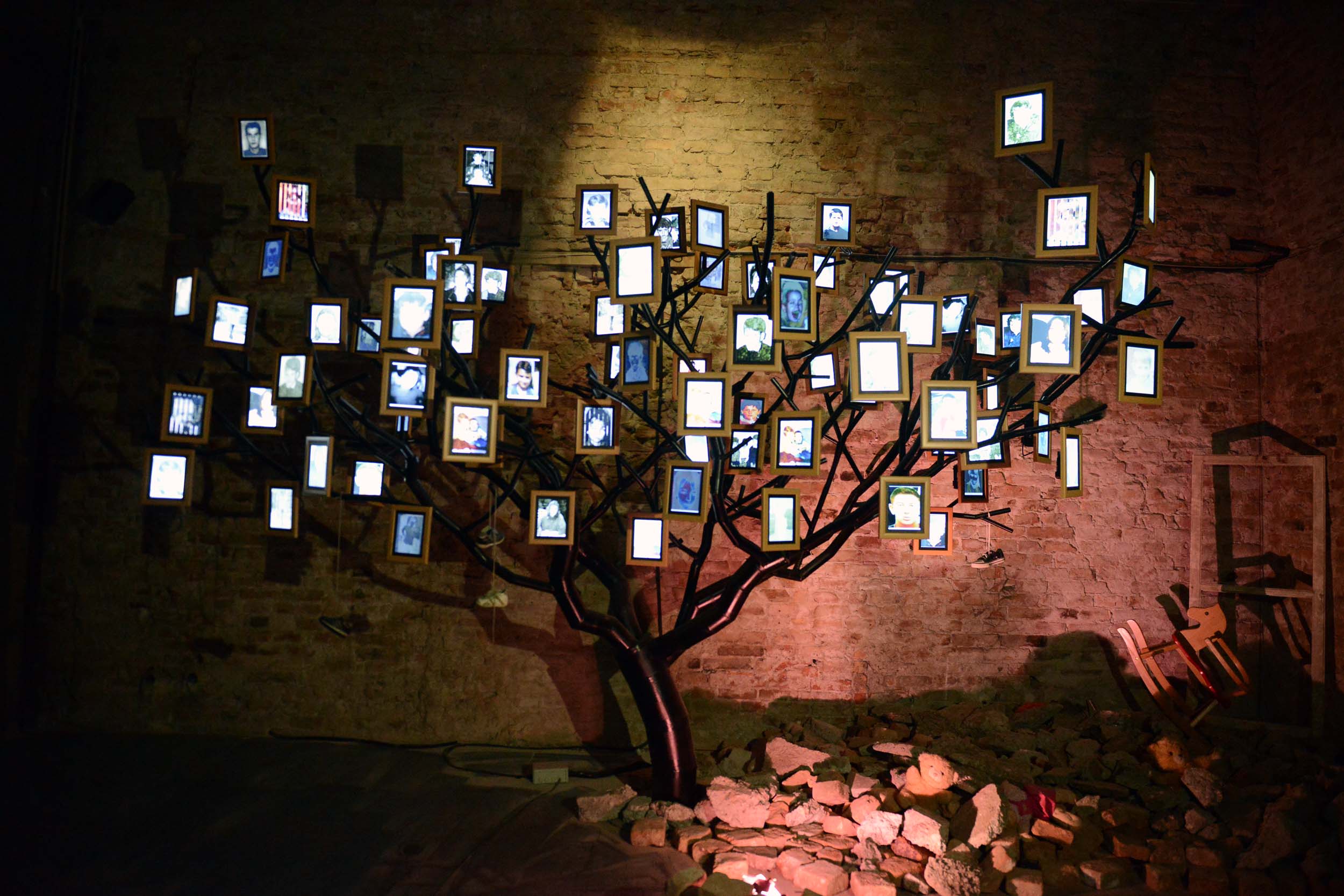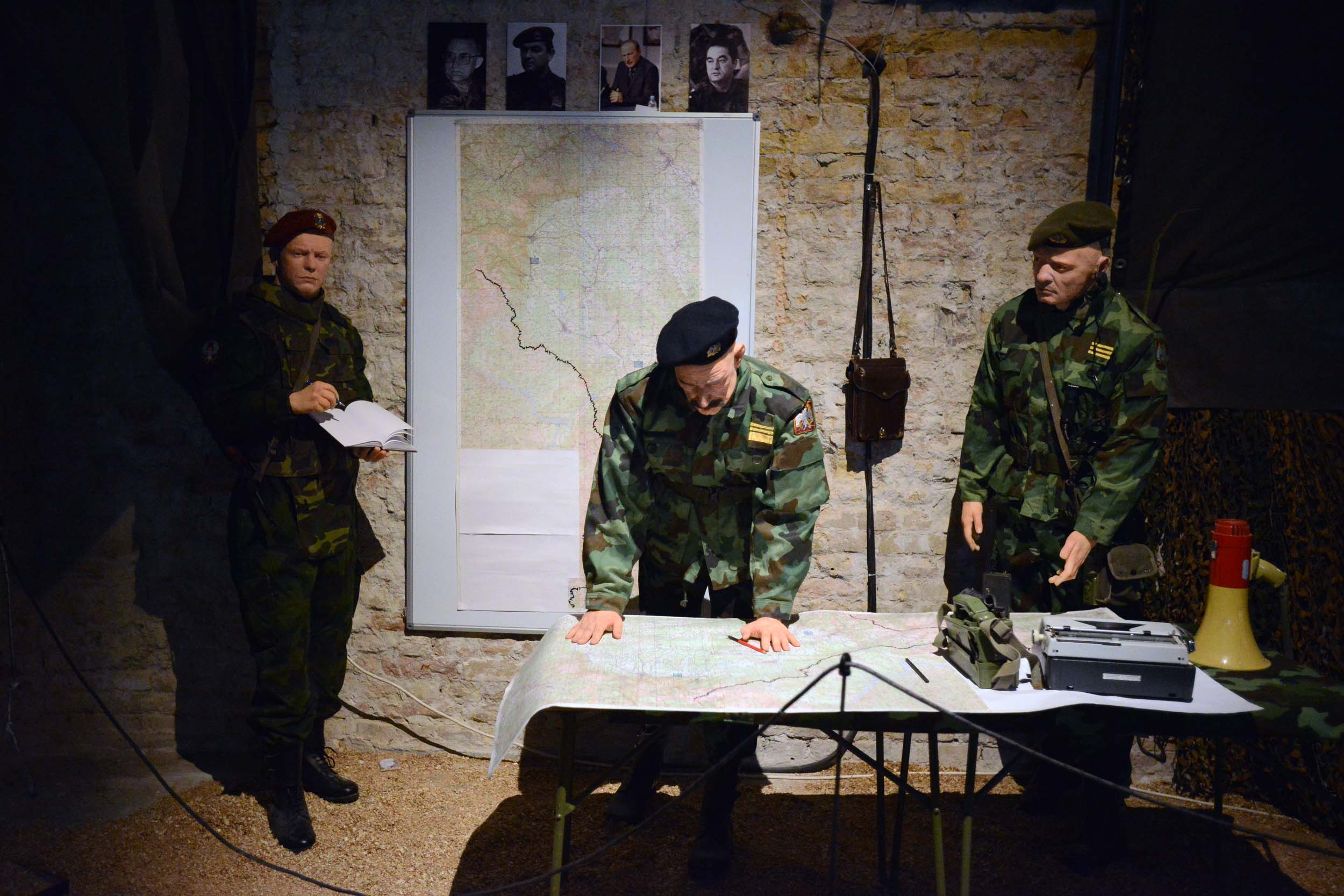17.04.2019.
Opening of Exhibition “Defence 78” Dedicated to Defence against NATO Aggression
Minister Vulin: The truth told by this exhibition may be interpreted differently, but it cannot be disputed
- NATO aggression was the last great crime of the 20th century. The NATO aggression was the end of a horrific and bloody century, during which the Serbs had not deserved to lose millions of people. There was not a single action of Serbia by which it caused or deserved the NATO aggression. There is no any Serbian guilt in the NATO aggression and terrible war of 1998 and 1999 - Minister of Defence Aleksandar Vulin underlined opening an exhibition of the Ministry of Defence and Serbian Armed Forces “Defence 78” in exhibition hall of the Museum of the City of Belgrade dedicated to commemoration of the 20th anniversary of defence of the fatherland against the NATO aggression.
Minister Vulin reminded that on that day, two decades before, Milica Rakić had been killed and emphasised that the exhibition was dedicated to all the killed, all soldiers, policeman and all who had lost their lifes in NATO aggression, all killed children and killed truth.
He stressed that Serbia was proud of its every soldier, officer, policeman, every man who had suffered and survived NATO bombardment.
 - There is not quilt in us, whatsoever. The fact that we lived and defended our country was not and it cannot be a justification for NATO aggression and NATO bombardment. In that 1999, everybody showed their true face - the Serbs showed their best, the most beautiful and the bravest face, and those who bombarded us showed their ugliest and weakest face. In that 1999, there was no difference between the front and the rear. Every citizen of Serbia was a target, and for them, every death of ours was just collateral damage and nothing else. We do have a reason to be proud, and when we think about 1999, we take pride in every soldier, policeman, officer and citizen of this country, and I do not believe that those who bombarded us can share the same feeling with us - Minister Vulin assessed.
- There is not quilt in us, whatsoever. The fact that we lived and defended our country was not and it cannot be a justification for NATO aggression and NATO bombardment. In that 1999, everybody showed their true face - the Serbs showed their best, the most beautiful and the bravest face, and those who bombarded us showed their ugliest and weakest face. In that 1999, there was no difference between the front and the rear. Every citizen of Serbia was a target, and for them, every death of ours was just collateral damage and nothing else. We do have a reason to be proud, and when we think about 1999, we take pride in every soldier, policeman, officer and citizen of this country, and I do not believe that those who bombarded us can share the same feeling with us - Minister Vulin assessed.According to him, the Serbian people knows the soldier’s glory and honours it even in their adversary, but there is no soldier’s glory in killing children and killing pregnant women in market places.
- I do not believe that they can share our pride, but they can share our other emotion which takes hold of us every time when we think about 1999 - sorrow. I hope that they feel sorrow when they think about our killed children, when they think about our killed soldiers and policemen. I hope that they share our sorrow, because sorrow is the first step towards regret, and regret is what we desire to see in all who killed Serbia back in 1999 - Minister Vulin stressed.
We look into the future - he added - and we have chosen to be militarily neutral, we do not wish conflicts with anybody and we want to build friendship, but - he underlined - we must never forget what came to pass.
- I do not believe in friendship based on the fact that you have to forget what happened, that you have to forget the evil that was done to you. The truth that we are about to tell by this exhibition is the truth that may be interpreted differently but it cannot be disputed - this is how it happened. The truth that you will see here is the truth lived by this people. This is an exhibition made by those who bombarded us in 1999 - Minister Vulin stated.
 According to him, we are looking into the future, we have chosen to be militarily neutral and never to do to others what was done to us. And we have chosen not to forget, because too often in their history, the Serbs forgot the evil that had been done to them in order not to hurt the others.
According to him, we are looking into the future, we have chosen to be militarily neutral and never to do to others what was done to us. And we have chosen not to forget, because too often in their history, the Serbs forgot the evil that had been done to them in order not to hurt the others.- That is how Serbia behaved until 2012, but since 2012, when Aleksandar Vučić became the Minister of Defence, Serbia does not allow somebody else to write its history and to tell it to forget - Minister Vulin concluded.
Speaking about the exhibition, the author Dušan Jovović pointed out that it was a project initiated by the Ministry of Defence and Serbian Armed Forces. He particularly stressed that the co-authors of the exhibition were the units of the Serbian Armed Forces, without which the setting up of the exhibition would have been impossible. We are especially grateful to the 250th Rocked Brigade for AD.
- The exhibition is a multimedia and interactive setup which for the first time displays video and printed material which have not been presented to the public until now, because the strength of their impact and the way in which they were recorded back in 1999, and all the material has been digitally processed - Jovović stressed adding that the main idea behind the interactive approach was to provoke emotions of the audience and show that the military and people were an indivisible unity and that there was no front.
He underlined that the exhibition was divided in eight segments, among which he singled out the “Safe room” which is dedicated to the killed children, while visual artistry rests upon authentic artefacts from 1998 and 1999.
The exhibition is a unique way to show the heroic defence of the country during 78 days of NATO aggression, which started by an attack on the FR Yugoslavia on 24th March 1999, without approval of the United Nations Security Council, and it is dedicated to the killed members of military, police and civilians, among whom, unfortunately, there were many children.
 The realisation of the exhibition was supported by “Jugoimport SDPR”, Radio Television of Serbia, Radio Television of Vojvodina, Studio B television, daily journals Večernje Novosti, Politika and Blic, company “Borba”, photographers Srđan Ilić and Tomislav Peternek and journalist Milena Mariković and Milutin Popadić.
The realisation of the exhibition was supported by “Jugoimport SDPR”, Radio Television of Serbia, Radio Television of Vojvodina, Studio B television, daily journals Večernje Novosti, Politika and Blic, company “Borba”, photographers Srđan Ilić and Tomislav Peternek and journalist Milena Mariković and Milutin Popadić.The opening of the exhibition was attended by ministers in the Government, Chief of General Staff of the Serbian Armed Forces Lieutenant General Milan Mojsilović with members of his Board, the members of the Board of the minister of defence, representatives of the Ministry of Defence and Serbian Armed Forces, Ministry of Interior, City of Belgrade, retired members of the system of defence, and representatives of public and cultural life.
The exhibition in the Museum of the City of Belgrade, 40b Resavska Street, is open every day between 10 and 19 hours, except on Mondays.




